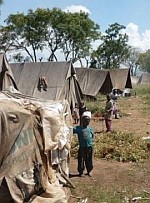NAIROBI/NEW YORK, Jan. 23, 2012—The decision of the International Criminal Court (ICC) confirming charges of crimes against humanity against William Ruto, Joshua Sang, Francis Muthaura, and Uhuru Kenyatta, and declining to confirm charges against Henry Kosgey and Mohammed Ali is an important step towards ensuring criminal responsibility for the post-election violence that scarred the country in 2007–2008. It also serves as a reminder that the vast majority of victims have still not seen justice done, the International Center for Transitional Justice (ICTJ) said.
“Hundreds of families lost their loved ones; women, girls, and men suffered sexual violence; and hundreds of thousands of Kenyans were displaced. Yet the vast majority of victims are still waiting for justice four years after the violence,” said ICTJ president David Tolbert. “The confirmation of charges against the four suspects marks a critical step in the process to establish responsibility.”
The judges of the Pre-Trial Chamber found there is sufficient evidence to commit four of the six suspects to trial. All Kenyans—including the accused and governmental authorities—should respect this ruling, cooperate with the court, and seek to foster peace. Those aggrieved by the decision must avoid acting or speaking in a way that may incite further hatred or violence.
In accordance with fair trial principles, the four accused persons are presumed innocent until proven guilty. This principle must be respected. However, in the interests of justice and efficient governance the two accused individuals who still hold public office should relinquish their positions unless and until the ICC cases are dismissed or they are acquitted. It should further be noted that the non-confirmation of charges against Henry Kosgey and Mohamed Ali does not mean the cases against them are closed. The prosecutor may seek fresh confirmations if he acquires additional and sufficient evidence to support the rejected charges.
“While the ICC process is welcome, due to the limited jurisdiction and finite resources the court will only try a limited number of cases. Kenyan authorities must ensure that credible national prosecutions take place in parallel to the proceedings in The Hague to ensure that others responsible are held to account,” said Christine Alai, acting head of ICTJ Kenya. “The government can no longer ignore the plight of the victims of the post-election violence and should initiate an independent mechanism to pursue accountability and provide redress as a matter of urgency.”
Visit the ICC website for a summary of decision in the Kenya cases.
About ICTJ
The International Center for Transitional Justice (ICTJ) works to redress and prevent the most severe violations of human rights by confronting legacies of mass abuse. ICTJ seeks holistic solutions to promote accountability and create just and peaceful societies. For more information, visit www.ictj.org.
Contact
Christine Alai Acting Head, ICTJ Kenya Office Tel +254 20 387 7508/ 386 0201 Cell +254 721308911 calai@ictj.org
Refik Hodzic Director, ICTJ Communications Tel +1 917 637 3853 Cell +1 917 975 2305 rhodzic@ictj.org
Photo: IDP tents at Ngiwa Farm camp, Rongai, Nakuru. IDPs have been living here since they fled their homes in parts of the Rift Valley worst affected by the post election violence in early 2008.
